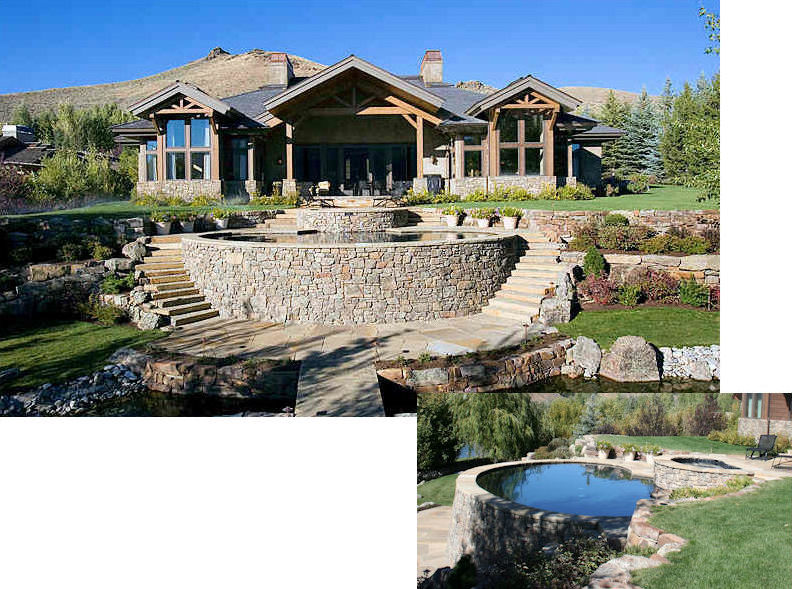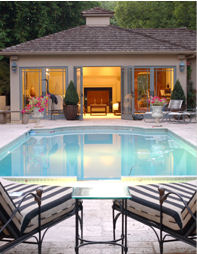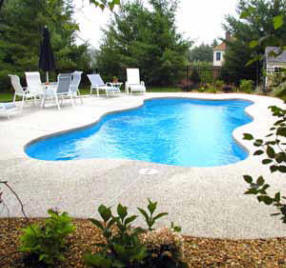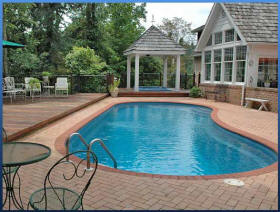FAQ’s
- What precautions should I take while choosing for a pool builder to build my swimming pool?
- How much pool can I afford?
- What type of pool is appropriate for my yard?
- Is my yard suited for a swimming pool?
- Do I need to be worried about zoning?
- How long does it take to install a pool?
- What sort of pool equipment do I need?
- Does a swimming pool affect my insurance?
- What do I need to know about pool safety?
- What kind of pool is best for me?
1 – What precautions should I take while choosing for a pool builder to build my swimming pool?
Here are some things to consider when choosing a pool builder:
- Determine through local pool service professionals how long a builder has been building quality projects.
- Do you know a friend or neighbor who has used the same company with good long lasting results?
- How long has your contractor been in business and what is his experience?
- What is his standing with your local Building Department, the State Department of Consumer Affairs and/or Contractor’s Board?
- Is he a Certified Professional Builder with the Association of Pool and Spa Professionals (the industry’s governing body)? This certification not only requires that a builder pass an exhaustive written test, it requires ongoing educational credits to maintain that certification.
- Verify a perspective builder’s membership in any builder’s guilds or professional organizations that he indicates he is a member of. These professional connections give him a strong support network which he can call upon to inform himself if he is lacking information on a particular item.
- Does he involve himself in industry educational programs, technical seminars, and trade shows where new ideas and products are displayed.
- Always request a list of references, both recent and older projects.
- Is he capable of bringing a wide range of products and services for your consideration without overwhelming you?
- Does he present his products and services fairly without attacking competitive products and services?
Study the final proposal carefully to be sure you are satisfied with all aspects of your plan. Changing the plan during the course of construction can result in unanticipated delays and cost considerations
2 – How much pool can I afford?
Construction or Installation Expenses
Above-Ground Pools: These pools are installed not built. Therefore, they are more economical to purchase or construct. Larger, more elaborate above-ground pools with filtration equipment will cost between $3,000 – $8,000.
In-Ground Pools: Please contact us for current price ranges on Gunite(Concrete), Vinyl, Fiberglass or Steel pools.
On-Going Expenses
Chemicals: Average around $30 per month depending on your pool size and frequency of use.
Opening and Closing A Pool: Hiring a professional to open and close your pool each season will cost approximately $200.
Utilities: While utility bills do increase during a pool’s open season, the use of automatic time clocks and solar covers will reduce this expense.
3 – What type of pool is appropriate for my yard?
We recommend installing a pool type that would be appropriate with the value of your property and the neighborhood you live in. You do not want your pool to decrease your property value. Likewise, you do not want to invest more than you may receive in return in the future.
4 – Is my yard suited for a swimming pool?
Besides determining the best fit for your yard dimensions, consider your yard slope, and accessibility for construction equipment. Severe conditions such as steep sloped lots, rocky soil, underground water tables, and limited access require special construction and installation considerations and typically add to the overall cost and duration of the project.
5 – Do I need to be worried about zoning?
Zoning is primarily handled on a local level and typically covers such issues as fencing and barriers, set-backs and proximity to utility lines. Other issues may also be covered. We will be able to inform you of the requirements for your area.
6 – How long does it take to install a pool?
Above-ground pools
Above-ground pools can be installed in a matter of hours or a few days.
In-ground pools
An in-ground pool takes an average of 3 to 7 weeks depending on the complexity of the project. CHI offers guaranteed completion dates upon request. Anticipate a little dirt in your life during construction of an in-ground pool.
7 – What sort of pool equipment do I need?
Pumps
A quality contractor can design a system with a lower dynamic head (flow loss due to friction) which will allow the use of a smaller pump. The contractor accomplishes this by using a larger pipe size and a minimal amount of fittings. The initial installation cost may be higher but the end result is a more energy efficient system.
Filters
- HI-RATE SAND media
This type of filter utilizes a fine bed of silica through which the pool water flows. The dirt particles are trapped in the upper layer of the sand, and from time to time, when the loading of the dirt reaches a certain point, it is necessary to flush the sand clean by “backwashing” the filter. - DIATOMACEOUS EARTH (D.E.)
This type of filter contains a series of grids covered with a durable fabric. The fabric covered grids are “pre-coated” with a fine powder (diatomaceous earth) and as the water flows through, the dirt particles collect on the powder covered grids. When the dirt loading reaches a certain point, the filter must be “backwashed” , then re-coated with the powder. - MODULAR MEDIA (cartridge)
This filter contains either a single “cartridge” or a series of cartridges made of filter fabric. The pool water is forced through the cartridge and the dirt particles become trapped on the surface of the fabric. When the dirt loading becomes excessive the cartridge must be removed and cleaned. No backwashing is required.
Heaters
In our area a pool heater of some type will extend the swimming season. There are many types of heaters to choose from, such as natural gas, liquid propane gas, solar powered, and heat pumps.
To compliment the heater and to reduce the heat loss from the pool, a pool cover should also be considered. There are many types of covers, each with their own features including efficiency, durability, and safety.
Pool Cleaners
The Paramount PV3 in-floor cleaning systems are the most convenient and technologically advanced automatic pool that will also circulate the water efficiently, saving you money on heating and chemicals. The use of a high flow pool cleaner will also save you money on heating and chemicals.
8 – Does a swimming pool affect my insurance?
Insurance coverage for swimming pools is part of homeowners insurance. Some insurance companies raise premiums for owning a swimming pool and others do not. Speak with your insurance agent prior to purchasing or building your pool.
9 – What do I need to know about pool safety?
Please see safety
10 – What kind of pool is best for me?
In Ground Concrete Pool
Advantages of Gunite Pools:

Concrete (Gunite) pools allow the most flexible design. They can be shaped any way you like while being very strong and resilient.
- An in-ground gunite pool is a permanent structure. It as an extension of your house and typically adds value to your property.
- Gunite pools are custom and more personal. If you like to think out of the box and seek a more unique design that reflects your personality, a gunite pool allows that. Gunite pools can be built in any shape or size.
- Gunite pools can have a variety of interior finishes including, for example, all-tile, pebble, granite, colored plaster. If you like to think out of the box and seek a more unique design that reflects your personality, a gunite pool would be a better choice. Gunite pools are highly durable, and they can be built in any shape or size
- A properly constructed gunite pool can last a lifetime. With proper water balance, the interior should not need refinished for approximate 30 years.
Disadvantages of Gunite Pools:
- In-ground gunite pools are usually more expensive and take longer to construct.
- Cement interiors are easier for algae to adhere to. However, proper water balance, which should be maintained for your family’s health, will prevent algae.
Considerations for Gunite Pools:
- Interior Finish: A variety of selections are available, including white plaster, pebble, colored plaster, quartz, polished surface or glass bead finishes
- Decorative Tile: Decorative tiles and mosaics will detail to your pool.
- Decking & Coping: Your decking choices are unlimited and are available on all types of pools.
Fiberglass Pools
Fiberglass Pools

Fiberglass pools are made at the manufacturer and delivered in one piece. Typically more flexible than concrete pools and are a good choice in earthquake prone areas. The entire pool is a one-piece fiberglass shell.
Advantages of Fiberglass Pools:
- Typically installed in less time than any other type of pool.
- Smooth, non-abrasive finish and an inert composition that helps inhibit algae formation, lowering chemical and maintenance costs.
Disadvantages of Fiberglass Pools:
- While all other types of swimming pools offer unlimited sizes and shapes, the fiberglass pool is installed “as-is,” with fewer choices for size, shape, and depth.
- Delivery to your location requires a semi-truck and pilot cars. Depending on where the pool is shipping from, this may raise the cost of the pool considerably. Be sure you consider freight costs in your budget.


Stainless Steel Pools
There are two main configurations of stainless steel swimming pools:
- stainless steel walls with a concrete bottom
- stainless steel walls with a vinyl liner
A full line of special custom features in available to round out any of these configurations.
Vinyl-Liner Pools
Advantages of Vinyl-liner Pools:

- Less expensive
- A variety of liner patterns are available, many shapes and design options are available.
- They are engineered to standards at the factory.
- Repairs are typically quick and inexpensive,
Disadvantages of Vinyl-Liner Pools:
- Liner eventually needs to be replaced.
Installation of vinyl-liner pools:
- A vinyl-liner swimming pool is delivered to the site as a kit.
- After excavation, the panel walls are bolted together and supported at the bottom by a concrete footing.
- A custom made vinyl-liner then covers the entire pool. It is connected to the top of the panel walls by a vinyl rib at the outside edge of the liner. The vinyl-liner is the only visible part to the pool owner







